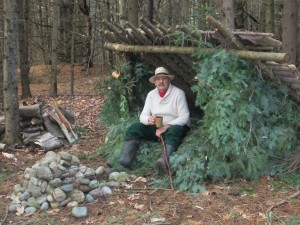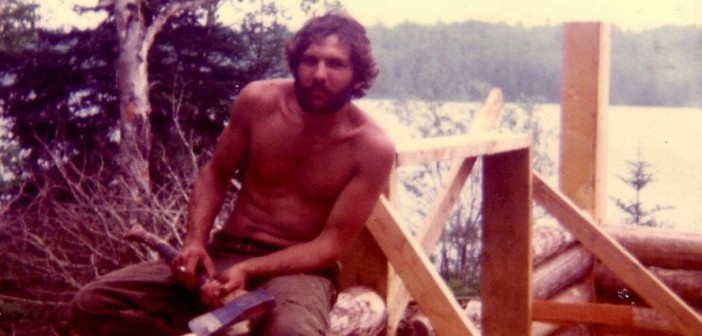Editors Note: The Northern Hoot is so pleased to have the humble honour of sharing tales from the Algoma District’s much loved and most ‘infamous’, Farmer Bob. His stories were first published in 2013 in his book A Rough and Ribald Story of a Lifetime in the Bush.
A Rough and Ribald Story of a Lifetime in the Bush
Dedicated to Leonard St. Jean Baptiste Cuerrier 1915 -2000
His favourite saying in the bush was, “It’s all hardship and misery, boys,” and we found that the harder the hardship and the deeper the misery the happier he seemed to be. A case of rural old-time Catholicism, Metis stoicism, and the austere conditions in which he was raised. He liked the rough life.
ACKNOWLEGMENTS
I was lucky to have spent my early years in the bush at a time when the old timers were still there. There were many of them bunked up in little cabins up and down the line: old men, many crippled by accidents, arthritis or age, fellows just waiting for the end. Yet they were still strong of spirit, content and pleased to share their story.
The vital times in the lives of these men were spent on the other side of the great historical hinge. Their experiences went back to the axe and cross cut saw, the dog team, the raft and canoe, ice houses, salt pork, and rugged individualism – to traplines, logging, guiding, and the quest for gold.
They saw the passage of time differently, worked very hard but rarely felt rushed.
With the perfection of nature as a foil, they were able to see the comic absurdities in their lives, and their adventures are a telling witness.
They were all men with amplified personalities, which is what happens when you spend a lot of time alone in the wilderness. You grow distinct and singular, you don’t care who sees it and make no attempt to bend to imposed conventions like city people do. You just can’t and, best of all, out there you don’t have to.
They were different.
These old fellows shaped how I viewed and lived my own life in the bush and were my inspiration of writing these stories. And if my scribblings are just a little hand hewn, hell, I know they wouldn’t care.
I also need to thank the men who were my primary partners at different times in the bush: Shoney, my brother Earl, and Silas. Their stories, although not their side of it, they might protest, are written here. It’s real tough to live in isolation with only another man as a partner. It’s a tribute to all of us that we remain the very best of friends many decades later.
My buddy, Tracy Mullins, was a big help. He’d done time working on the ACR track gang, is as good a drinker as he is a storyteller, and we had some great evenings swapping tales of a life along the line. He helped me remember. Brian Latham did the same, encouraged me all the way and sent me lists of things to think and write about.
Then there’s Susie who taught me how to use the computer when she realized I couldn’t write a legible or coherent thought otherwise and even if I did I’d lose the copy. She and my sister Pat, also knocked a little of the roughest bark off my writing.
There are all the folks to thank that I stuck stories in front of when they visited in order to get a review: John Wilson, Pat Stewart, Cathy Wierzbicki, all of my family, friends, and even the near strangers I blind-sided in this effort.
Also thanks to the ACR, Calna McGoldrick, and many others who in many ways supported the project.
Chapter 1 Scribbling
My name is Robert Cuerrier, and I have lived on the land traditionally for most of my life. I was born on a small backwoods farm – a place where time was tethered. My father, Leonard St. Jean Baptiste, farmed, logged, and trapped and my mother worked just as hard. My first memories are the sight and smell of muskrat hides on drying boards leaning on every wall in our home.
I have always felt so fortunate to live in a time when I was able to straddle both the horse drawn and the computer eras. I’ve lived some in town and I’ve lived in the bush. Since I am a Métis, I can see life the eyes of a white man and an Indian. My life has been an intoxicating, curious cocktail.
Over the years I have worked and played on the Algoma Central Railway that travels in to the bush north of Sault Ste. Marie, Ontario. I have hunted for food, built wilderness log cabins on a very remote lakes, logged, prospected, and guided. For the last twenty years I have worked my horse drawn farm at Mockingbird Hill, Mile 9 at the Odena flag stop on the ACR.
Journalistic Integrity
It has been said that I have such a high regard for truth that I use it with penurious frugality. I do allow I have been known to tell the occasional stretcher and that grand hyperbole is no small part of my persona. Some say that I’m a shameless and unrepentant media mooch. Others say that I would follow a man into an outhouse if he would listen to one of my stories. But I’m dyin’ if I’m lyin’ if anything said in this book isn’t so…although I am going to scatter a few words around promiscuously.
Don’t look for anything in my scribblings: grammar, spelling, coherence, or good sense (which according to my wife I stopped making years ago). I’m not a writer folks, I’m more of a word butcher.
The Men That Don’t Fit In
Every man has his reason for a life in the bush. Some answer the call of the wild or have special skills that draw them there. Others find a need for solitude, adventure, a place to heal the bruises on a broken heart. For some, the wind just kind of blew them that way. Many are men who don’t fit in.
As a young fellow I was restless. I found out early that I couldn’t work for wages. After a few days as a schoolteacher I had an epiphany. You see, there was the rabid waving of little hands mostly asking to be excused to go to the washroom. The grand plans I had for life seemed diminished so I turned in my pencil. I determined that never again in life would I contractually tie myself to the bowels, bladders, or wishes of another man and headed north.
“There’s a race of men that don’t fit in,
A race that can’t stay still;
So they break the hearts of kith and kin,
And they roam the world at will.
They range the field and they rove the flood,
And they climb the mountain’s crest;
Theirs is the curse of the gipsy blood,
And they don’t how to rest.”
~ Robert Service
The Great Mystery
Most old men who spent their lives in the bush believe that religion is the land itself, the open sky and all that lives there. The Creator speaks through the birds, animals, and running water. All things are one.
*****
Robert Currier, or as many know him- Farmer Bob, has lived on the land traditionally most of his life. He has built wilderness log cabins, logged, guided and prospected. He was the first recipient of the CBC/Big Brothers “Northern Moose Award” for best personifying the spirit of Northern Ontario.
cabins, logged, guided and prospected. He was the first recipient of the CBC/Big Brothers “Northern Moose Award” for best personifying the spirit of Northern Ontario.
Farmer Bob lives on his Mockingbird Hill Homestead Farm in beautiful Hiawatha Highlands, which backs onto Odena, Mile 9 on the Algoma Central Line. The farm is a singular burst of colour and beauty and one of Sault Ste. Marie’s premier attractions. It is open to the public year round.
Mockingbird Hill is a horse drawn replica of a Métis homestead in the thirties and forties. In summer the farm features wagon rides, market gardening, a petting barn, a corn maze, and a spectacular wild flower walk.
In winter Mockingbird Hill offers horse drawn sleigh rides and cutter rides on trails that are breathtakingly beautiful by day and romantically lantern-lit by night.
1.705.253.4712


